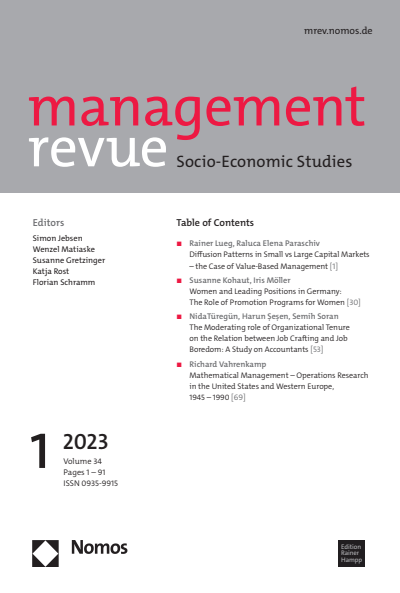Does Confucian Culture Promote Innovation? An Empirical Investigation of a Leading Organization in the Field
IF 1.7
0 MANAGEMENT
引用次数: 3
Abstract
Based on their growing innovation capabilities, Chinese companies have become important players in the global innovation arena. Among the factors influencing these firms’ innovation, cultural values have increasingly attracted scholars’ attention. However, research on the relationship between one of the key elements of traditional Chinese culture, Confucianism, and innovation remains scarce. By focusing on two core elements of Confucianism, we extend the innovation contingency literature in examining whether Confucianism is associated with management and product innovation at the firm level in China. Through an empirical examination of a highly innovative private company in China’s premium kitchen appliance market, we find that Confucianism, as reflected in innovative management practices, can foster product innovation. Specifically, benevolence as a Confucian virtue can trigger innovation by forcing a user-centred focus and widening managers’ perspectives of stakeholder interests. Another Confucian principle, the Doctrine of the Mean, can also boost innovation by yielding harmony with surrounding elements, such as users, space, and nature, and defining the employee-management relationship.儒家文化促进创新吗?对某领域领先组织的实证调查
凭借不断增强的创新能力,中国企业已成为全球创新舞台上的重要参与者。在影响企业创新的因素中,文化价值观越来越受到学者们的关注。然而,对中国传统文化的关键要素之一——儒家思想与创新之间关系的研究仍然很少。通过关注儒家思想的两个核心要素,我们扩展了创新权变文献,以检验儒家思想是否与中国企业层面的管理和产品创新有关。通过对中国高端厨房电器市场中一家具有高度创新能力的民营企业的实证研究,我们发现儒家思想在创新管理实践中可以促进产品创新。具体来说,作为儒家美德的仁爱可以通过强迫以用户为中心的关注和扩大管理者对利益相关者利益的视角来激发创新。另一个儒家原则,中庸,也可以通过与周围元素(如用户,空间和自然)的和谐以及定义员工与管理的关系来促进创新。
本文章由计算机程序翻译,如有差异,请以英文原文为准。
求助全文
约1分钟内获得全文
求助全文
来源期刊

Management Revue
MANAGEMENT-
CiteScore
1.20
自引率
0.00%
发文量
7
期刊介绍:
Management Revue - Socio-Economic Studies is an interdisciplinary European journal that undergoes peer review. It publishes qualitative and quantitative work, along with purely theoretical papers, contributing to the study of management, organization, and industrial relations. The journal welcomes contributions from various disciplines, including business and public administration, organizational behavior, economics, sociology, and psychology. Regular features include reviews of books relevant to management and organization studies.
Special issues provide a unique perspective on specific research fields. Organized by selected guest editors, each special issue includes at least two overview articles from leaders in the field, along with at least three new empirical papers and up to ten book reviews related to the topic.
The journal aims to offer in-depth insights into selected research topics, presenting potentially controversial perspectives, new theoretical insights, valuable empirical analysis, and brief reviews of key publications. Its objective is to establish Management Revue - Socio-Economic Studies as a top-quality symposium journal for the international academic community.
 求助内容:
求助内容: 应助结果提醒方式:
应助结果提醒方式:


